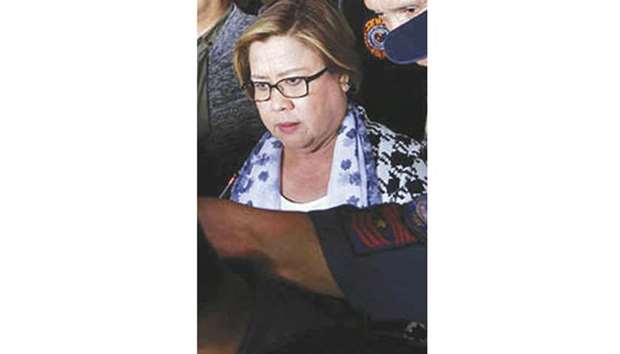A Philippine senator and Duterte’s long-time foe, de Lima was arrested in February on drugs charges she says were trumped up as part of a presidential vendetta.
Held at police detention facility in Manila that she shares with murder suspects and mangy cats, the 57-year-old lawyer remains implacably critical of the anti-narcotics campaign and Duterte, who will complete his first year in office this week.
“The promise of eradicating drugs has defined his presidency,” she said. “It’s actually a sham because they are targeting the wrong people.”
Duterte’s drug war, she says, targets only small-time dealers and leaves drug lords untouched.
Called a “prisoner of conscience” by Amnesty International, de Lima believes the real reason she has been locked up is to stop her asking questions about the thousands of killings that critics say have stained Duterte’s presidency.
Police say they have shot dead 3,135 suspects in anti-drug operations. They have also identified drugs as the motive in another 2,000 killings, and are investigating a further 7,000 murders and homicides.
De Lima and other critics believe many victims were killed by undercover police or their paid vigilantes — a charge the police deny.
Last year de Lima chaired a Senate inquiry into the drug war, grilling senior police and a self-confessed hitman in televised hearings that transfixed the nation.
The inquiry looked into allegations that police were summarily executing drug suspects in a pattern similar to killings in Davao City where Duterte had been mayor for 22 years.
De Lima’s toxic rivalry with Duterte began in 2009 when, as chair of the Philippine Commission on Human Rights (CHR), she started investigating a spate of vigilante-style killings in Davao City.
“It’s personal because of my history as CHR chair,” she said. “I investigated him on his own turf in Davao.”
A CHR report three years later confirmed the “systematic practice of extrajudicial killings” by a group known as the Davao Death Squad. Duterte denied any involvement in the murders.
Dressed in her own clothes rather than prison uniform, de Lima appeared relaxed and healthy as she spoke to Reuters in the visiting room of the detention facility, sealed off by high walls and rusting barbed wire inside the national police headquarters. But she described her incarceration as a kind of purgatory.
Pro-Duterte lawmakers threatened last year to screen a tape that purportedly showed de Lima having sex with her driver.
“They’re sexist pigs,” she said. “The whole point was to further embarrass me.” The tape is fake, she said.
De Lima and her siblings have told their 83-year-old mother that she has gone to the United States to study, fearing the truth of her arrest would be too upsetting. De Lima said that someone always watches television with her mother so that they can change the channel if she appears on the news.
“Psychologically and emotionally this is very challenging,” said de Lima. “It’s worse than death.” She said she feared that unknown enemies might poison her, and she only eats food brought in by family and friends.
De Lima is accused of accepting drug money from prisoners when she was justice secretary from 2010 and 2015.
She is not entitled to bail and, if found guilty, faces a maximum sentence of life imprisonment. “I’m completely innocent,” she said. De Lima is one of two women and 17 men at the facility.
Two of de Lima’s fellow inmates are former senators detained on corruption charges after an investigation de Lima had carried out when she was justice secretary.
She said she is held separately from the ex-senators and the other detainees, most of whom are held on murder charges. “My only companions are the stray cats,” she said. De Lima said she was given a rabies shot after one of them bit her.
With no television, cellphones or electronic devices allowed in her cell, de Lima said she was rediscovering books. She was now reading The Rise and Fall of the Third Reich, William Shirer’s landmark study of Hitler’s Germany.

